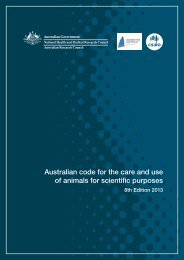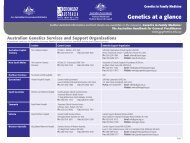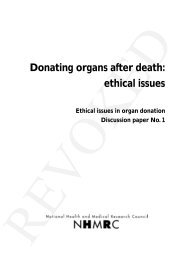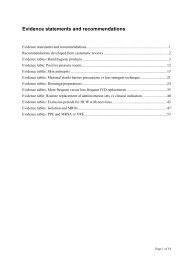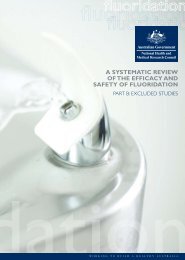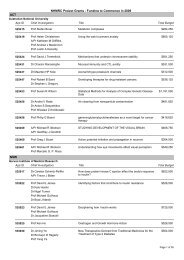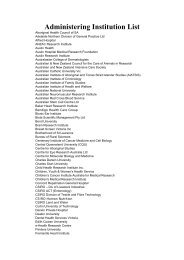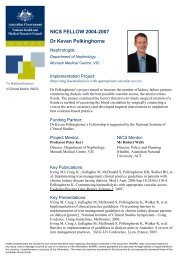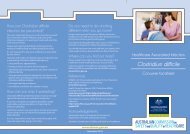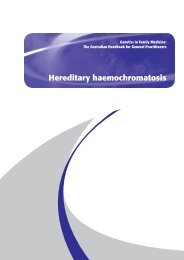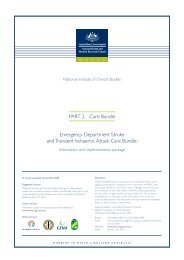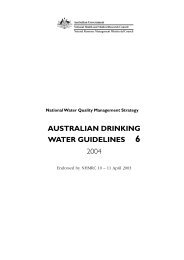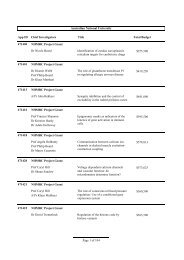Staying Healthy in Child Care - National Health and Medical ...
Staying Healthy in Child Care - National Health and Medical ...
Staying Healthy in Child Care - National Health and Medical ...
You also want an ePaper? Increase the reach of your titles
YUMPU automatically turns print PDFs into web optimized ePapers that Google loves.
Worms: Hydatid disease<br />
Description<br />
Hydatid disease is caused by a small tapeworm called Ech<strong>in</strong>ococcus granulosis. This<br />
is passed to humans from <strong>in</strong>fected dogs. The disease is transmitted when tapeworm<br />
eggs <strong>in</strong> dog faeces are transferred from h<strong>and</strong>s to mouths. This may happen when a<br />
person h<strong>and</strong>les dogs or objects soiled with dog faeces, or <strong>in</strong>gests contam<strong>in</strong>ated food or<br />
water. Hydatid disease is not transmitted directly from person to person.<br />
Hydatid disease causes cysts to grow <strong>in</strong> different parts of the body. Any organ may be<br />
affected. Sometimes these cysts cause no symptoms at all <strong>and</strong> are found dur<strong>in</strong>g<br />
rout<strong>in</strong>e chest X-rays. However, if the cysts grow <strong>in</strong> vital organs (such as the liver,<br />
lungs or bra<strong>in</strong>) they may cause disease. Hydatid disease is essentially a problem of the<br />
rural community, especially the sheep farmer.<br />
Incubation period<br />
Variable, from months to years, depend<strong>in</strong>g upon the number <strong>and</strong> location of cysts <strong>and</strong><br />
how rapidly they grow.<br />
Infectious period<br />
Dogs beg<strong>in</strong> to pass eggs of the parasite approximately seven weeks after becom<strong>in</strong>g<br />
<strong>in</strong>fected. Most <strong>in</strong>fections <strong>in</strong> dogs resolve with<strong>in</strong> 6 months, but some adult tapeworms<br />
may survive as long as 2–3 years. Dogs can become <strong>in</strong>fected repeatedly.<br />
Exclusion period<br />
Nil.<br />
Responsibilities of child care providers/staff<br />
Ensure rout<strong>in</strong>e de-worm<strong>in</strong>g of dogs <strong>in</strong> the community <strong>and</strong> particularly dogs that<br />
frequent the centre.<br />
Responsibilities of parents<br />
Ensure that adults <strong>and</strong> children wash their h<strong>and</strong>s before eat<strong>in</strong>g.<br />
Dispose of dog faeces regularly, wear<strong>in</strong>g gloves.<br />
Controll<strong>in</strong>g the spread of <strong>in</strong>fection<br />
Ensure that adults <strong>and</strong> children wash their h<strong>and</strong>s before eat<strong>in</strong>g.<br />
Dispose of dog faeces regularly, wear<strong>in</strong>g gloves.<br />
Treatment<br />
This may be drug therapy, or surgery to remove the cysts.<br />
91<br />
Draft for Public Consultation



